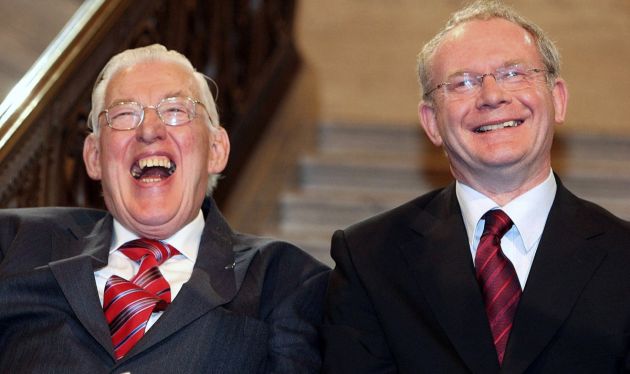Ian Paisley, firebrand N. Ireland Protestant leader turned peacemaker, dies

Once hardline Protestant leader, Rev. Ian Paisley, who later in his life opted for an alliance with bitter Catholic rivals helping to bring Northern Ireland peace, died Friday at the age of 88, his family said.
"My beloved husband, Ian, entered his eternal rest this morning," a statement announcing his death from wife Eileen said.
"Although ours is the grand hope of reunion, naturally as a family we are heartbroken. We loved him and he adored us, and our earthly lives are forever changed.
"According to Ian's wishes his funeral will be private and attended only by the immediate family, as will be his burial."
Paisley was born on 6 April 1926, and from 1971 to 2008 he was the leader of the Democratic Unionist Party which seeks to remain part of the United Kingdom and not join with its southern neighbor, the Republic of Ireland.
Northern Ireland is a part of the United Kingdom of Great Britain and Northern Ireland in the north-east of the island of Ireland.
For many years Northern Ireland's Protestant and Ireland communities were involved in a bloody conflict with one another.
FREE PRESBYTERIAN CHURCH
Paisley was the founding member of the Free Presbyterian Church of Ulster. which he belonged to for 57 years.
For many years Paisley was bitterly opposed to making any concessions to the Roman Catholic minority, many of whom favor closer ties with the Irish Republic or even having a united Ireland.
But he made concessions in negotiations and was elected as the First Minister of Northern Ireland alongside former Provisional Irish Republic Army leader and Sinn Féin member Martin McGuinness as deputy First Minister on May 8, 2007.
The two former foes forged a good working relationship and eventually became good friends.
McGuinness paid tribute to Paisley with the following tweet:
"Very sad to learn that Ian Paisley has died. My deepest sympathy to his wife Eileen & family. Once political opponents - I have lost a friend."
McGuinness told RTE, Ireland's national broadcaster, "I think we confounded the world by him, a pro-British, pro-Unionist politician, being able to work in a positive spirit with myself, an Irish Republican.
"A friendship grew out of that, and it's a friendship that lasted to this very day."
Paisley's family did say what caused his death, but he had suffered from heart trouble.
In office, he and McGuinness forged an unlikely friendship.
"Many a man has gone to his grave sticking to his line and never changing. But Ian Paisley did, he held out the arm of friendship," former Irish prime minister Bertie Ahern, who helped negotiate the 1998 deal, told RTE.
"But he paid a huge price for it politically... he did not get the support of a huge amount of people that had been close to him for 40 or 50 years," Ahern added.
Former British Prime Minister Tony Blair, who presided over the Good Friday Agreement the deal that clinched peace, said Paisley had been an "uncompromising, even intransigent" opponent.
However he ultimately knew when to compromise.
"Ian was a man of deep convictions. The convictions never changed. But his appreciation of the possibilities of peace, gradually and with much soul searching, did," said Tony Blair.
"He began as the militant. He ended as the peace-maker."